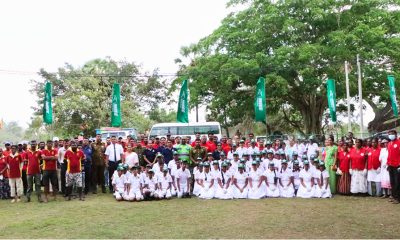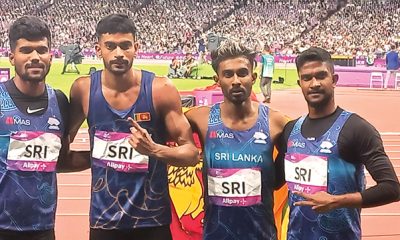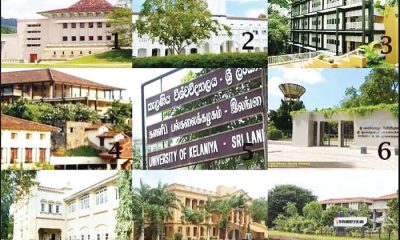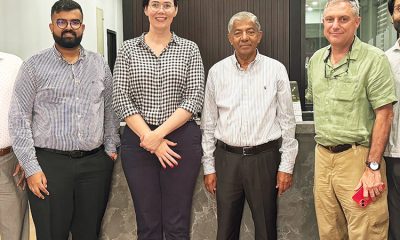Opinion
A tribute to Winitha (Winifred) Fernando

by Dr Laksiri Fernando
It is not so conventional for a husband to write an eulogy or memorial for his wife. However, we have not been very conventional in life on many matters and occasions. We were born in the same area of Moratuwa, more precisely Moratuwella, in between the Panadura river and the Indian Ocean. Therefore, the nature and water had some effect on our lives in a positive manner from the beginning. Only on rare occasions we had to be careful about the rising tide of the river or the angry behaviour of the sea. The area was fairly clean, and the residents were less than a quarter of the present population. Her house was along Francisco Place and ours was just beside St Peter’s Church.
It was after an initial stay in Ragala, where her father ran a petrol station, that she came with some of her siblings to stay at their ancestral home and to go to school in Moratuwa. While she studied at Princess of Wales College, I attended the Prince of Wales College. Her elder sister and one of my elder sisters were friends. This gave us the initial opportunity to become family friends. We also went to the same church and Sunday school at St Peter’s Church.
She had an initial adventurist nature to influence others through several devices. When I met her as a teenager, one of her tricks was to read or pretend to read others’ horoscopes. Perhaps she had learnt something from a Guru. I was bypassed, until I learned palm reading. Obviously, palm reading was more effective than horoscopes in conquering followers. That is how I managed to conquer her.
We had common endeavors in studying and preparing for examinations. That is how we came closer in early 1960s. We exchanged study notes, books, pens, pencils, and letters including love letters. Those days pens were not ball point but fountain pens. We sometimes got reprimanded by our families for these exchanges, but not necessarily for our friendship. In our family, Winitha was considered a good person and perhaps I also had the same reputation in her family. Among our topics of discussion, leftist politics started to take prominence given my close association with the Lanka Sama Samaja Party – even as a schoolboy.
We entered the University of Peradeniya, one after the other, I opting to do a special degree in Economics, and Winitha selecting B.Ed.. At Peradeniya, apart from our studies we were closely involved in radical left politics. Our objective was to keep the left movement as independent as possible from the main (bourgeoise) parties – although it was difficult to achieve. Those days, in the student movement, there was a fair balance between studies and student activism. However, things were changing during the latter stages of our student days.
In 1970, Winitha became a graduate teacher, first teaching at Kandapola and she was boarded at Nuwara Eliya. By that time, we were married. Our marriage was sudden and unconventional. My appointment at Vidyodaya University in June 1969 was an easy excuse for a sudden marriage. Under university rules, when a lecturer goes on overseas leave, the spouse received travel grants if they were married before the appointment. That was an excuse. We didn’t see any reason in having a conventional wedding or a grand ceremony, although our families were all ready for that.
This year, 2022, we completed 53 years of married life without any upheavals. Our only son, Ravi, born in 1973, was always on our side. His birth also marked a change in our lives, from being a less responsible couple to a more accountable parents. Politics became more of a theoretical or academic matter without our direct involvement.
We went to Canada in the mid 1970s to complete our postgraduate studies thanks to Prof A. J. Wilson’s help. Winitha completed a M.Ed. We became very close to Wilson family, Susili Wilson (S. J. V. Chelvanayakam’s daughter) as an inspirer. Through experience, we came to know the futility of Sinhala people suspecting or distancing themselves from Tamil people and vice versa, one of the causes of the ethnic conflict in Sri Lanka.
While more of her study courses centered around educational psychology, she selected “The Development of University Education in Sri Lanka, 1963 – 1971: Implications for Employment” as the research topic. She wrote “My main conclusion is that while it is to some extent clear that the expansion of university education during 1960s, with a greater emphasis on the humanities and social sciences, was largely responsible for aggravating the unemployment situation, there is, however, the more important consideration that a greater share of the blame for the situation has to be assigned to the tardy economic growth.”
Despite having obtained an MEd from the University of New Brunswick, she was not expecting any special treatment or promotion. She accompanied me to Geneva in 1984 until we decided to migrate to Australia for the sake of our son in 1991. She was also committed to the objectives of the World University Service (WUS) as I was.
She had completed a teaching career of over 15 years by then. Under new regulations, those teachers who had completed 12 years of teaching could obtain retirement and pension. However, she could not. When we applied for a pension, she was served with ‘a vacation of post notice.’ When an appeal was made, a person in charge of the matter said that we should go to the Minister. Although the Minister was personally known to both of us, Winitha refused to meet him as a matter of principle.
In Australia, she first served at the Community Services Centre in Bondi Junction. Then she obtained a casual teacher position in the Western Sydney area. Thus, we moved from East to West in Sydney. When a teacher was on leave or absent, she had to go and teach. No influence was necessary for these appointments. Although it was casual, considering her postgraduate qualifications from Canada, she was given a higher salary scale.
Teaching and teacher education appeared to make a big influence in a person’s personal character. She was calm and sober, balanced minded and moderate, and without jumping on to quick conclusions on any matter. After my retirement, our lives became much closer during the last ten years or so. We again started to exchange things like shirts and shoes, like in our young age. She was delighted to wear my shirts.
For the last three years, we have been staying at the Bruce Sharpe Lodge in Rockdale, Sydney. Australia which provides excellent services to old-aged people particularly with health issues. Her passing away was completely unexpected. She was admitted to hospital due to a brain aneurysm. Although a successful surgery was done, contracting Covid surprisingly in the ICU, prevented her further recovery. No health system appears to be faultless in any country today. Negligence or challenge of Covid was a major factor.
Winifred passed away peacefully without much suffering on 12 August. Our daughter-in-law Clare, our grandson Josh, our son Ravi, and I were by her side during her last moments. She passed away at 4:33 am on 12 August.
May she Rest in Peace.
May she attain Nibbana.
(This tribute was written with inputs from our son, Ravi Fernando.)
Opinion
Dayan Jayatilleka’s ‘Interventions: Selected Political Writings’

by Prof. Rajiva Wijesinha
The Marga Institute hosted last Friday the launch of a new book by my good friend Dayan Jayatilleka, a collection of his essays which was called ‘Interventions’. I continue to admire his energy, which has prompted him to throw himself into the current political debate. After much thought, all of which he has laid down systematically over the last several months, he has decided to promote the JVP, or rather the NPP, in any forthcoming election.
This was the subject of much of the discussion, which I found most stimulating. The stage was set by Kusum Wijetilleke, who chaired the discussion, and suggested that Dayan’s predilection for the NPP was perhaps misplaced in that there were worries about the absence of coherent policy statements from them. Kusum did begin by stating that he had always supported the UNP, though given his intelligent analyses over the last couple of years one was relieved to find that by this he meant the SJB.
Unfortunately, as Dayan has pointed out – which is why he has moved to the NPP after initially making positive comments about Sajith Premadasa – the SJB seems stuck in neoliberal economics, given the influence of Kabir Hashim, whose role in the bond scam should not be forgotten or excused, the painfully doctrinaire if admirably honest Eran Wickramaratne, and the decent but deplorably malleable Harsha de Silva. Lovable though he is, I found his somersaults after his initial demand that Ranil should go after the 2018 local elections laughable, but also sad since they left the only other person courageous enough to say the same thing out on a limb.
And I must confess I find it difficult to forget Harsha’s efforts to subvert, with the famous footnotes, the second COPE investigation into the bond scam, quite unlike the decent way in which Eran Wickramaratne behaved in the first investigation, which was spearheaded by D E W Gunasekara and myself. Incidentally, I should note what a pleasure it was to see the old warhorse after several months, still as principled and forceful as ever.
Though Harsha’s backbone seems to have strengthened in the last few months, I still wonder about whether he will in the end be tempted back by Ranil Wickremesinghe he continued to admire when he had totally betrayed the ideals of those who accepted him when the Yahapalanaya coalition was established to overcome the disasters of the years immediately preceding.
Charitha Herath, in a characteristically thoughtful contribution, wondered as to why the SJB cannot make the differences between them and current Ranil/Rajapaksa policies clear, to which Dayan responded forcefully that it was obviously the troika mentioned above which stopped him from pursuing the ideals he had been brought up on. And he added further that because of those characters the SJB seemed incapable of developing a coherent foreign policy that was based on the national sovereignty President Premadasa had upheld, and might instead turn into an even more subservient agent of the unipolar world they seemed to favour.
With regard to its economic policy, though perhaps this also has a bearing on foreign policy, Kusum thought the SJB would find it difficult to move too far from what he described as traditional right wing UNP economics. But Dayan pointed out that this was a recent phenomenon, and you could not get a more people friendly philosophy than Ranasinghe Premadasa’s.
He noted, to my surprise, that Lakshman Watawala had recently noted the need for the SJB to adopt Premadasa type policies but had been put down by a rampantly doctrinaire Eran. And though there might be arguments for a more Western oriented foreign policy being traditionally that of the UNP, given the predilections of both Sir John Kotelawala and J R Jayewardene, we should not forget the moderate approach of Dudley Senanayake, who had decided not to seek membership of ASEAN when it seemed a surrogate for the West.
I did contribute briefly to the discussion, in noting that I thought Dayan’s transition to the NPP was totally understandable given that it was becoming increasingly clear that the other parties, despite Sajith Premadasa’s essential decency, offered no alternative to the disastrous rent seeking of the last several decades; I added that Dayan, whose decision making processes I have always admired, has a tendency to then go gung ho for what he decides on.
But I also wanted to place on record that in private he is more circumspect, for instance having always, in the midst of his affection for Mahinda Rajapaksa, made clear his worries about his brothers, with greater and greater understanding and despair about where and how they were leading Mahinda.
And, finally, I noted that I could not understand what I had heard before Kusum as what I term Colombo 7 worries about policy deficiencies on the part of the NPP. Those who pompously put this position ignore the fact that the prevalent political philosophy, as shown again and again by parties that get into power, is that, whatever policies they present before that happens, they ignore them almost totally afterwards.
My experience of the Yahapalanaya government which had an admirable long manifesto which was virtually shredded the moment Sirisena came into office has convinced me that, as far as almost all Sri Lankan politicians are concerned, there is no point at all in looking at, let along thinking about, the policies they enunciate for elections.
I noted before making these points that, just when Dayan started on his latest round of reflections, after the manifest failure of the Gotabhaya Rajapaksa government, I had moved firmly in a different direction, in that I had written as long piece called an Apology for my Ennui. The withdrawal I had embarked on in the latter part of 2021 was hastened by my contracting corona towards the end of that year, which left me without the energy to do much. And then the chaos of the following year, which led to the most cynical partnerships, made me feel there was, as Anne Ranasinghe put it, nothing left but to mourn.
Still, it was good to be back, if briefly, in the cut and thrust of debate and discussion amongst so many decent people, including the admirable Sarath Amunugama. And it was heartening that the brightest and best of the younger generation, Uditha Devapriya and Uthpala Wijesuriya, who had done so much for the new George Keyt book, and also the admirable Kamaya Jayatissa, have contributed to the book, and contributed so hearteningly to the discussion.
Opinion
Columbia protesters taken into custody after police enter campus—CBS News
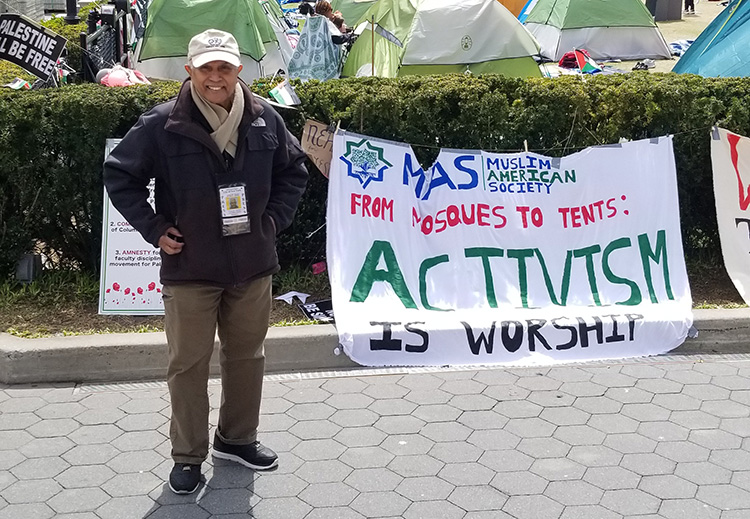
by Thalif Deen
At a press conference last Tuesday night, New York City Mayor and his Police Commissioner tried to justify police intervention against pro-Palestinian demonstrators at Columbia University claiming the protests have been corrupted by “outside agitators.”
I think this is a steaming pile of horse shit (forget bulls).
Last Saturday, I visited the site. The entire campus was on a locked-down mode. Of the seven or eight entrances and exits, only one was open, with several security officers standing by. Only current students, academics —and the press– were allowed in. The security checks were tight.
How “outside agitators” infiltrated the campus beats me—unless they parachuted or were air-dropped on the sprawling campus.? Like American food drops in Gaza.
I noticed the only press pass valid was the New York city press pass issued in collaboration with the New York Police Department (NYPD) — although I was also armed with the UN press pass, the US State Department press ID and my Columbia student ID of a bygone era.
The 80 tents brought back memories because they occupied the huge lawn opposite the Journalism School. I still remember a creative sign on that lawn back in my student days: “IF ALLOWED TO GROW, THIS GRASS WILL PRODUCE ENOUGH OXYGEN FOR TWO STUDENTS TO BREATHE FOR ONE SEMESTER”.
Forget “KEEP OFF THE GRASS”.
(The writer, a former journalist on the old Ceylon Observer, was a Fulbright student at the Columbia School of Journalism in the seventies. He worked in Hong Kong for about a year before returning to the U.S. where he lives and has long headed the UN Bureau of the Inter Press Service (IPS).)
Opinion
Nalin de Silva, his world and our worlds
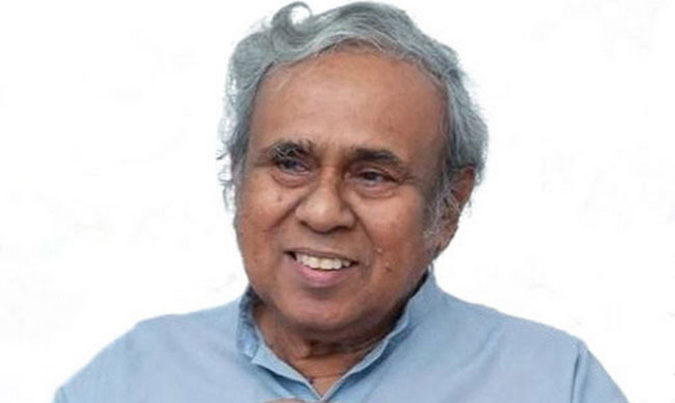
It is hard to think of any Sri Lankan academic who has been vilified the way Nalin Kumar De Silva was. Nalin was not averse to calling out his ideological opponents and not in very polite terms either, but all those epithets essentially boiled down to ‘Pawns of the West,’ nothing more. He was, on the other hand, called racist, chauvinist and warmonger. Some, who obviously were clueless about ‘nation’ would call him ‘nationalist’ as though that was some kind of four-letter word.
There were others who referred to Nalin and his ideological comrade Gunadasa Amarasekera as ‘native intellectuals.’ They probably didn’t understand the word ‘intellect’ and its derivatives. I believe it was Nalin or maybe it was Gunadasa who observed that the term implied ‘international intellectuals.’ Perhaps those who called them ‘native intellectuals’ did so to confer upon themselves the tag ‘international intellectual’ but the very use of the term disqualified them, obviously. Pawns they were and are, Nalin believed.
The more informed, less threatened and less malicious referred to him as one of the two top ideologues of what was known as the ‘Jathika Chinthanaya School’ (the other being Gunadasa). No one has really succeeded in translating ‘Jathika Chinthanaya’ into English. ‘National Ideology’ somehow seems crude and erroneous. Those who subscribed to this school of thought, however, knew. They had a sense.
Nalin passed away in California, USA just a few hours before I started writing this. The final rites will be held from 1 to 5 pm (PST) on Sunday, May 5 at Fremont Blvd, Fremont. It is probably too soon to offer a comprehensive review of his work, as a teacher, political activist and thinker. It has to be mostly anecdotal but maybe that’s all I can do, not having associated with him closely.
Like most people who ‘knew’ Nalin, knowledge came mostly from reading what he has written. ‘Magey Lokaya’ (My world), probably the essay that best captures his theoretical explorations, is probably one of the most influential political treatises of the late 20th century. There were other books which addressed what was dubbed ‘The ethnic conflict’ where Nalin cogently tore apart the creative historiography of Eelamists and their apologists who had many axes to grind with the Sinhalese and/or Buddhists. In addition there were innumerable articles published weekly in the Divaina, Vidusara and later in the Midweek Review of ‘The Island.’ I’ll come to those later.
The first time I met him was when I went to see my friend and teacher Arjuna Parakrama. This was in the early 1990s. We were walking towards the ‘Open Canteen’ of the Colombo University when we ran into Nalin. Apparently the two had agreed to a debate. Arjuna said something about the logistics and added, ‘we must make sure we don’t become pawns of other people.’ Nalin muttered something with a laugh and walked away. Arjuna had heard: ‘he said I am a pawn.’ Arjuna didn’t take it as an insult. I don’t know if the debate did take place, but Arjuna told me years later that Nalin had acknowledged that he, Arjuna, was a good trade unionist. This was when Nalin had been suspended by the university.
My first one-on-one encounter happened in the late nineties. I was a student in the USA at the time and had written to Nalin. I was politically associated with the ‘Janatha Mithuro’ then and felt that Nalin’s ongoing clashes with Champika Ranawaka were unnecessary. I mentioned this. Nalin replied. He was ‘soft’ in the criticism. He merely stated, ‘No one disputes that Champika is very bright, but he should acknowledge the source of his ideas.
’ Champika, after he disassociated himself from the JVP-led student movement, was one of the prominent acolytes of Nalin’s ‘Chinthana Parshadaya.’ Convinced that a political movement and not a forum to discuss ideological/philosophical matters was what was needed, he, along with other young people who had become skeptical about Marxism, launched first the Ratawesi Peramuna and later the Janatha Mithuro. Nalin was one of their strongest critics.
I met him next at the Divaina editorial office. It must have been in 2001. I was working at the Sunday Island but enjoyed spending an hour or two at the Divaina. One day I saw Nalin and after saying hello, asked him if he had come to hand over an article. What follows is the rough English translation of what he told me in Sinhala. ‘No Malinda. You know, it’s a small amount that they pay me, but it is not small for me; even so it is irregular.’ It was the only income he had at the time.
In 2006 in Celigny, Switzerland, at a media opportunity just prior to the commencement of talks between the Government and the LTTE, I casually asked Jehan Perera of the National Peace Council who happened to be there, ‘how many people could you get to Lipton Circus for a protest if you didn’t have funding?’ Jehan, ideologically at odds with me though he was, offered an honest response: ‘probably none.’
That was the difference. The NGOs had bucks. They had, in 2002, a government committed to federalism and a president who was not in disagreement. They had both the private and state media at their disposal. The nationalists had Nalin and a few others.
The 1990s were all about federalism. Those opposed to federalism were called warmongers, racists and chauvinists. Nalin got a lot of that. And yet, after it had led to the ridiculous Ceasefire Agreement signed on February 22, 2002 and the consequent pantomime of ‘peace’ talks, federalism became a joke. The UPFA routed the UNP in April 2004 and Mahinda Rajapaksa pipped Ranil Wickremesinghe at the presidential election the following year, admittedly with some help from the LTTE which called for a boycott, probably costing Ranil the election.
That turn around in the fortunes of the nationalists may have surprised the Anglicized sections of the population, but what they probably never understood is the role played by Nalin, Gunadasa and others for well over two decades countering every lie of the Eelsmists, their apologists and other colonial remnants who can’t get enough of the English and English.
Several years later, in a new political avatar where he spoke of the bodisatva ‘Natha Deyyo,’ inviting much ridicule and invective, paradoxically from those who fervently believe in a creator god, immaculate conception, rising from the dead and so on, Nalin wrote ‘Batahira vidyava saha deviyo (Western science and god).’ I was invited to speak at the launch, as was Prof Carlo Fonseka.
Carlo, as irrepressible as Nalin, opted to focus on a chapter that the author had suggested he avoid. Nalin, responding, completely refuted Carlo. He had said, in Sinhala, ‘I didn’t want to do that to him; I knew I would have to if he chose to focus on that chapter; he did and I had no choice but to take him apart.’
In retrospect one could argue that Nalin should have avoided supporting politicians and political parties, but those moments hardly make a dent in the enormous contributions he has made to the political and ideological discourse in and on post Independence Sri Lanka. At worst, his texts need to be engaged with. Indeed, his detractors cannot but have a conversation with his works.
Nalin, for all his lectures on the chathuskotikaya (in opposition to the dvikotiyaka or the dialectic) was eminently dialectic in his political engagements, possibly a habit acquired during his Trotskyite days which he failed to shed after he felt Marxism was an inadequate and even erroneous doctrine. This is probably why he was often ‘in your fact’ with political and ideological opponents and found it hard to work with and develop a group of like-minded thinkers/activists. Again, this is hardly a serious crime. To me, anyway, he was an exceptional thinker and an influencer unlike any other over the past 40 years.
Nalin was indefatigable. He was all over the newspapers and when social media became fashionable he adapted quickly, writing daily posts using language appropriate to this new media culture. His last post was just a few days ago; in fact he mentioned that he was unwell and will not be writing for a few days. He won’t write again but he’s written so much that it would take years for anyone to go through the full corpus of his writings. He was, in his writing and his engagements, relentless.
May his sojourn through Sansara be brief.
Malinda Seneviratne
-

 Features4 days ago
Features4 days agoSearching for Dayan Jayatilleka
-

 Business6 days ago
Business6 days agoINSEE Ecocycle marks 21 years of environmental excellence with a city cleaning program in Anuradhapura
-

 Sports6 days ago
Sports6 days agoUS visa issues deny Sri Lanka Olympic qualifying opportunity in Bahamas
-

 Features7 days ago
Features7 days agoCalling applications for MBBS!
-

 News2 days ago
News2 days agoLankan wins UK’s prestigious hair and beauty awards 2024
-

 News4 days ago
News4 days agoBIA thrown into turmoil as foreign firm handles on-arrival visa counter
-

 Features6 days ago
Features6 days agoWhy are SL universities’ positions low in world ranking indices?
-

 Business2 days ago
Business2 days agoUSDA Under Secy Taylor visits New Anthoney’s Farms and commends its pursuit towards sustainable poultry practices














